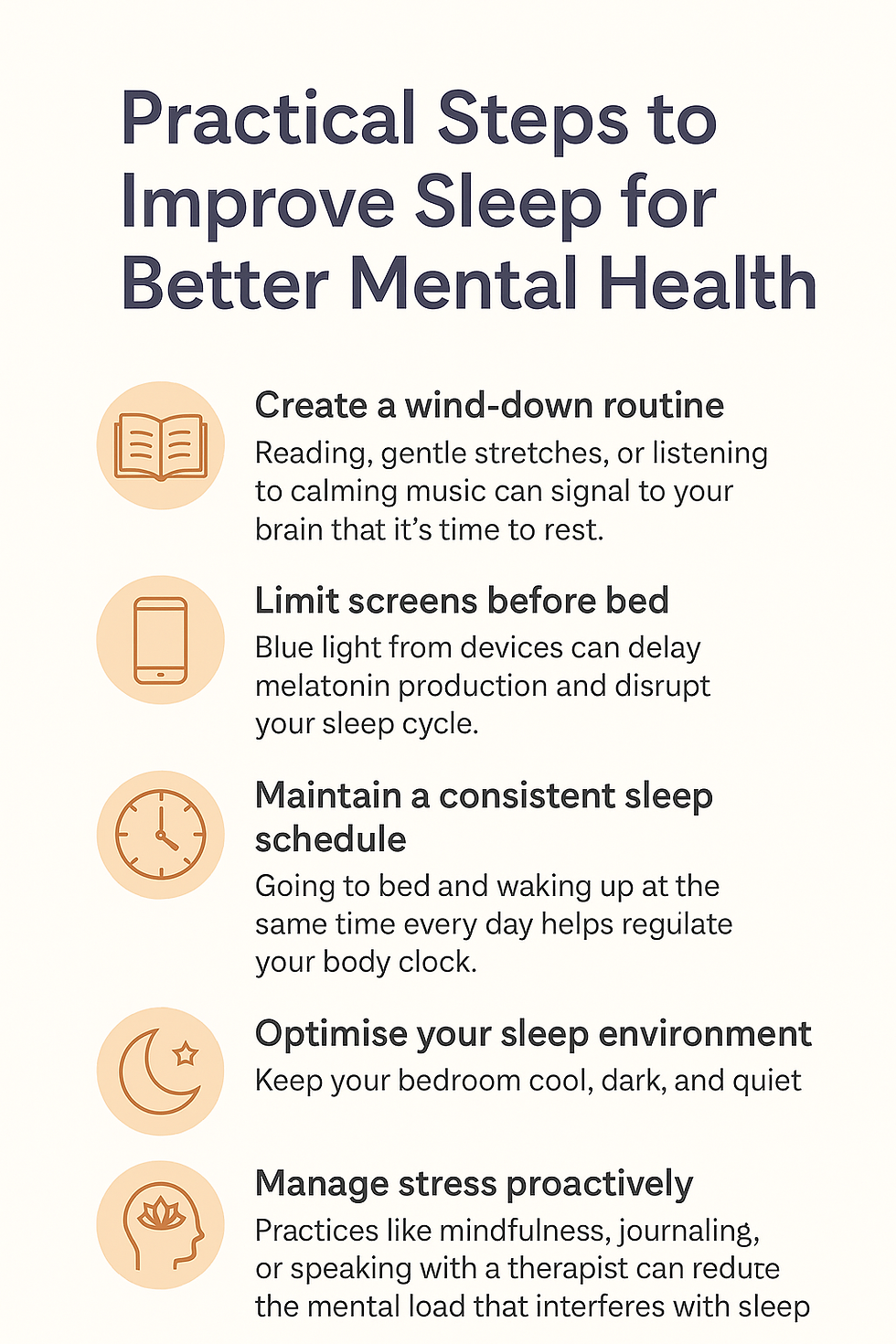The Impact of Sleep Quality and Quantity on Mental Health
- Deborah Marks
- Aug 18, 2025
- 3 min read

Why Sleep Matters for Mental Health
Sleep is far more than a way to rest the body. It is a vital biological process that restores brain function, regulates emotions, and supports mental resilience. When we consistently get enough high-quality sleep, we give our minds the best chance to process daily experiences, manage stress, and maintain balanced moods. On the other hand, poor sleep can increase the risk of mental health challenges such as anxiety, depression, and emotional dysregulation.
The Link Between Sleep and Emotional Wellbeing
Researchers have found a two-way relationship between sleep and mental health. Poor sleep can worsen symptoms of anxiety and depression, and those conditions, in turn, can make it harder to sleep well. Sleep affects:
Emotional regulation: Sleep loss reduces activity in the prefrontal cortex (responsible for rational thinking) and increases reactivity in the amygdala (the brain’s emotional centre). This can lead to mood swings, irritability, and heightened stress responses.
Cognitive function: Sleep helps consolidate memory, improve focus, and strengthen decision-making skills. Without adequate rest, mental clarity suffers.
Stress response: Chronic sleep deprivation increases the production of cortisol (the stress hormone), which can heighten feelings of anxiety and make relaxation harder.
How Sleep Quantity Affects Mental Health
The amount of sleep you need can vary based on age, lifestyle, and health, but adults typically benefit from 7 to 9 hours per night. Regularly getting less than this can have cumulative effects, including:
Persistent fatigue and low motivation
Reduced tolerance for stress
Difficulty concentrating or remembering information
Increased risk of developing mood disorders
Why Sleep Quality is Just as Important as Quantity
You might be in bed for eight hours, but if your sleep is fragmented or shallow, your brain misses out on crucial restorative stages, particularly deep sleep and REM sleep. Poor sleep quality can be caused by:
Stress or anxiety
Excessive caffeine or alcohol use
Uncomfortable sleep environments (light, noise, temperature)
Sleep disorders like insomnia or sleep apnoea
Practical Steps to Improve Sleep for Better Mental Health
Small, consistent changes can make a big difference in sleep quality and mental wellbeing:
Create a wind-down routine – Reading, gentle stretches, or listening to calming music can signal to your brain that it’s time to rest.
Limit screens before bed – Blue light from devices can delay melatonin production and disrupt your sleep cycle.
Maintain a consistent sleep schedule – Going to bed and waking up at the same time every day helps regulate your body clock.
Optimise your sleep environment – Keep your bedroom cool, dark, and quiet.
Manage stress proactively – Practices like mindfulness, journaling, or speaking with a therapist can reduce the mental load that interferes with sleep.

When to Seek Professional Help
If you are experiencing ongoing sleep difficulties that affect your mood, focus, or daily functioning, it may be time to speak with a mental health professional or sleep specialist. Sleep issues can be both a symptom and a cause of mental health challenges, so early support can help break the cycle.
Final Thoughts
Good sleep is not a luxury, it is a foundation of mental and emotional health. By prioritising both the quality and quantity of your rest, you give yourself the best chance to feel balanced, energised, and mentally strong.
If you are struggling with sleep or finding it impacts your mood and wellbeing, know that you are not alone. Support is available, and with the right strategies, restful nights are possible - reach out today.



Comments